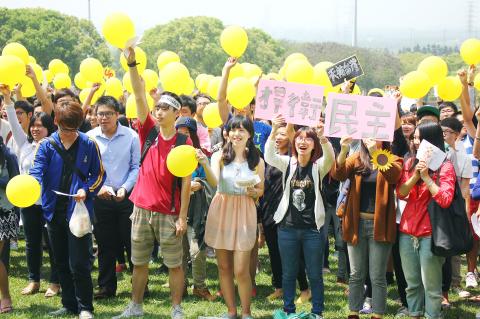A poll released yesterday found an overwhelming majority of respondents — 82.96 percent — are unhappy with the way the administration of President Ma Ying-jeou (馬英九) handled the Sunflower movement protests over the past three weeks.
The survey, conducted by the Chinese-language Liberty Times’ (the Taipei Times’ sister newspaper) polling center on Wednesday and Thursday nights, also found that a majority of respondents thought the student activism would deepen democracy in Taiwan.
The Sunflower movement became the name of the protesters who occupied the Legislative Yuan on March 18 to protest against the government’s handling of the cross-strait service trade agreement.

Photo: Lin Yi-chang, Taipei Times
The movement’s sit-in inside the legislature’s main chamber ended on Thursday evening when more than 100 protesters left the building.
When asked about the movement’s demands that a law governing oversight of cross-strait negotiations be passed before a review of the service trade pact is resumed, 74.19 percent of respondents agreed with the demand, 17.44 percent disagreed and 8.37 percent had no opinion, the poll found.
More than half of those polled — 58.32 percent — were against student protesters having to face legal action over their actions.
Of those surveyed, 34.28 percent favored the judiciary investigating the protesters, while 6.4 percent declined to comment.
Even among supporters of the Chinese Nationalist Party (KMT), the dissatisfaction rates were high.
Analysis showed that among those respondents who said they favored the KMT, 71.16 percent were not happy with the government’s handling of the Legislative Yuan protest, while 25 percent backed the administration.
Among those who said they supported the Democratic Progressive Party, 94.44 percent said that the government had mishandled the situation, while 3.47 percent said they were satisfied with the government’s reaction.
Among those respondents who said they were politically neutral, 82.47 percent did not agree with the government’s handling of the student-led opposition, while only 10.6 percent were in favor.
Comparing the Presidential Office’s response to the Wild Lilies student protest in 1990, when then-president Lee Teng-hui (李登輝) met with student representatives at his office and gave concrete answers to their demands, the poll found that respondents were unhappy with the Presidential Office’s initial criticism of the Sunflower movement and its subsequent sidestepping of the students’ demands.
The Liberty Times poll interviewed 1,015 people aged 20 or above through a random sampling of the last two digits of home telephone numbers nationwide.
The poll has a margin of error of 3.08 percentage points positive or negative and was completely funded by the Liberty Times.

INVESTIGATION: The case is the latest instance of a DPP figure being implicated in an espionage network accused of allegedly leaking information to Chinese intelligence Democratic Progressive Party (DPP) member Ho Jen-chieh (何仁傑) was detained and held incommunicado yesterday on suspicion of spying for China during his tenure as assistant to then-minister of foreign affairs Joseph Wu (吳釗燮). The Taipei District Prosecutors’ Office said Ho was implicated during its investigation into alleged spying activities by former Presidential Office consultant Wu Shang-yu (吳尚雨). Prosecutors said there is reason to believe Ho breached the National Security Act (國家安全法) by leaking classified Ministry of Foreign Affairs information to Chinese intelligence. Following interrogation, prosecutors petitioned the Taipei District Court to detain Ho, citing concerns over potential collusion or tampering of evidence. The

NEGOTIATIONS: Taiwan has good relations with Washington and the outlook for the negotiations looks promising, Minister of Economic Affairs J.W. Kuo said Taiwan’s GDP growth this year is expected to decrease by 0.43 to 1.61 percentage points due to the effects of US tariffs, National Development Council (NDC) Minister Paul Liu (劉鏡清) said at a meeting of the legislature’s Economics Committee in Taipei yesterday, citing a preliminary estimate by a private research institution. Taiwan’s economy would be significantly affected by the 32 percent “reciprocal” tariffs slapped by the US, which took effect yesterday, Liu said, adding that GDP growth could fall below 3 percent and potentially even dip below 2 percent to 1.53 percent this year. The council has commissioned another institution

TRADE: The premier pledged safeguards on ‘Made in Taiwan’ labeling, anti-dumping measures and stricter export controls to strengthen its position in trade talks Products labeled “made in Taiwan” must be genuinely made in Taiwan, Premier Cho Jung-tai (卓榮泰) said yesterday, vowing to enforce strict safeguards against “origin laundering” and initiate anti-dumping investigations to prevent China dumping its products in Taiwan. Cho made the remarks in a discussion session with representatives from industries in Kaohsiung. In response to the US government’s recent announcement of “reciprocal” tariffs on its trading partners, President William Lai (賴清德) and Cho last week began a series of consultations with industry leaders nationwide to gather feedback and address concerns. Taiwanese and US officials held a videoconference on Friday evening to discuss the

NEGOTIATIONS: The US response to the countermeasures and plans Taiwan presented has been positive, including boosting procurement and investment, the president said Taiwan is included in the first group for trade negotiations with the US, President William Lai (賴清德) said yesterday, as he seeks to shield Taiwanese exporters from a 32 percent tariff. In Washington, US Trade Representative Jamieson Greer said in an interview on Fox News on Thursday that he would speak to his Taiwanese and Israeli counterparts yesterday about tariffs after holding a long discussion with the Vietnamese earlier. US President Donald Trump on Wednesday postponed punishing levies on multiple trade partners, including Taiwan, for three months after trillions of US dollars were wiped off global markets. He has maintained a 10 percent